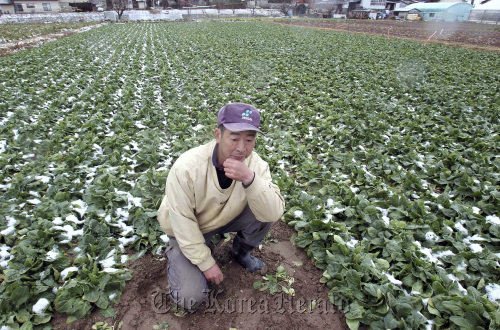NIHONMATSU, Japan (AFP) ― Farmers are facing the bitter aftermath of Japan’s nuclear emergency, which could see crops left to rot over a vast swathe of the country’s agricultural heartland.
Growing national and international unease about the spread of radioactivity from the crippled Fukushima nuclear power plant has led to bans on the sale of produce from four prefectures.
Farmers working the soil in Fukushima say they are bracing for the economic impact of the boycott, which has seen their vegetables pulled from shelves nationwide and a host of countries halting imports.
Tadayoshi Tsugeno, who farms just outside Nihonmatsu in Fukushima prefecture, began planting fields full of mitsuba, a prized herb used in top-end cooking, nine months ago.
“This is exactly the time when we should be harvesting the plants, but we have no idea whether or not we will be able to sell them,” the 59-year-old told AFP.
“We are being told that we need to get rid of them and that’s going to be expensive. This is my biggest crop, my biggest earner for the year.
“I planted these in June, so there’s been the expense of farming them since then, which I’m not going to get back if I can’t sell them.”
“I won’t be able to buy things and I’ve got debts to service. It’s going to be hard.”
Japan’s agricultural sector, cosseted by a protectionist government and the beneficiary of generous subsidies, is a powerful voice in national politics, especially through Japan Agricultural Cooperatives (JA) which lobbies on behalf of its members.
Senior JA officers visited ministers and top lawmakers Monday to lobby for compensation.
Farmers have long been able to charge a premium to customers in Japan and abroad, trading on the country’s rock-solid reputation for the quality and safety of its food.
But the huge tsunami that knocked out cooling systems at the nuclear power station on Fukushima’s coast following the 9.0-magnitude earthquake more than two weeks ago, has ― for the time being at least ― put paid to that reputation.
Ra

A farmer in Fukushima ponders what to do with his spinach, in an area affected by radioactive substances released from the Fukushima No. 1 nuclear power plant. (MCT)
dioactive vapor from the plant has contaminated farm produce and dairy products in the region, leading to restrictions on shipments to key markets in the United States, the European Union, China and others.
At the weekend, Singapore extended its ban, suspending imports of all fruit and vegetables from the whole Kanto region, a large area including greater Tokyo.
Higher than normal radiation was last week detected in tap water in and around Tokyo, some 250 kilometers from the plant, leading authorities at one stage to warn against using it for baby milk formula.
And the radiation threat appears to be spreading, with contaminated lettuce from Ibaraki prefecture, produced hundreds of kilometers from the stricken plant, found at a wholesale market in Nagoya.
The contamination is a further worry for a country already reeling from the effects of the quake-tsunami, which has killed more than 10,000 people, with around 17,000 people still listed as missing.
Just a few kilometers from Tsugeno’s farm, supermarket manager Misako Anzai confirmed she had taken all local vegetables off her shelves.
“We were told that we should not be selling things produced in Fukushima, so we have stopped,” she said.
Anzai said they were sourcing goods from further afield, despite the extra costs, and regardless of the impact on local suppliers, whose livelihoods depend on the relationships they have built up over the years.
“Our local producer complained yesterday and asked us if we could sell his goods. It’s sad, but we have to stop,” she said.
“We would really like to be able to help ... but we have been told not to sell these things, and we have to think about what customers want.”
Mizuko Ouchi was loading her basket with fresh produce to cook for her family.
“I think we have to be very careful because these are things we buy every day,” she said. “If I have the chance to buy food produced somewhere else ... somewhere a long way from Fukushima, I think I will.”
Ouchi’s attitude is exactly what farmers like Satoru Abe fear.
He was out in his fields pruning pear trees for a crop he expects will be ready at the end of August.
“I don’t know if we’ll be able to sell them, but we have to get things ready or we won’t have a chance to,” he said.
“All farmers are worried at the moment.”






